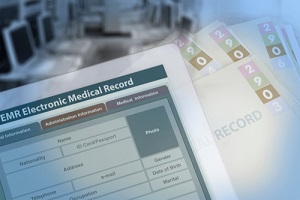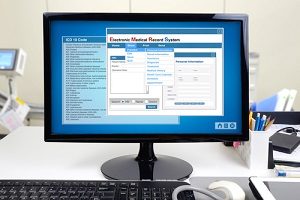Fraud Related to Electronic Health Records
 As the use of electronic health records (EHRs), also known as electronic medical records (EMRs), has expanded, so too has the fraud associated with EHRs.
As the use of electronic health records (EHRs), also known as electronic medical records (EMRs), has expanded, so too has the fraud associated with EHRs.
Individuals with knowledge of fraud related to EHR systems – whether in the form of false claims for EHR incentive payments, or in the form of false billings resulting from the use of EHRs – may be able to report their information by filing a qui tam case as a whistleblower under the False Claims Act.
EHR and Medical Records Fraud Topics Covered Here:
What is an Electronic Health Record?
An electronic health record (EHR) is a digital version of a patient’s chart.
The systems, in theory, allow for real-time sharing of patient-centered records including histories, orders, prescriptions, lab and imaging information, and more. EHRs offer the possibility of easily portable records that patients could share with different providers as needed. For providers, this means that more information should be available and record keeping improved.
In addition, EHR systems provide or integrate with billing systems, attaching diagnostic and procedure codes based on clinical information entered into the EHRs.
Issues with Poor EHR Systems
Poor EHR systems are not just an IT problem: they can threaten patient health.
Inaccurate medication records could lead to adverse drug interactions or dosage errors. Bugs in an EHR system or incompatibilities between different systems may lead to critical results not being reported.
The systems’ tendency to warn for every small error may result in “error fatigue,” causing clinicians to miss truly important warnings. Poor system interfaces and buggy code may result in inaccurate information being recorded or incorrect orders given.
With so much on the line, it is critical that EHR systems work as designed.
Government Payments for EHR
Healthcare providers – hospitals and “eligible professionals” – purchase EHR systems from EHR vendors. Healthcare providers are then eligible to submit claims to HHS for incentive payments to offset the cost of those EHR systems. These EHR incentive payments are substantial.
In 2019, Kaiser Health News reported that HHS had spent $36 billion on efforts to speed the adoption of EHR.
In support of their claims for incentive payments, hospitals and providers must state that they:
- Have EHR technology certified to meet specified standards; and
- Meaningfully use that certified EHR technology.
Electronic Medical Records (EHR) Fraud
EHR vendors and healthcare providers commit fraud when they attempt to game the system in order to secure incentive payments to which the providers are not entitled.
Providers may be liable for knowingly submitting false claims for EHR incentive payments. Providers have settled claims that they misrepresented their usage of the systems, or knowingly misstated the functions of the system in operation.
EHR vendors may face liability for false incentive payment claims to the government, even though the EHR providers themselves do not receive such payments from the government. Electronic health records providers have settled cases alleging that they fraudulently obtained certification for their software, knowing that it did not, in fact, meet HHS standards.
EHR companies have even been found to have created special versions of their software for the sole purpose of undergoing the required certification testing, knowing that their software, as actually implemented for providers, would function far differently.
Unlawful Kickbacks Associated with EHR Systems
EHR vendors and providers may also face liability for violations of the Anti-Kickback Statute, which prohibits medical providers from paying or receiving kickbacks, remuneration, or anything of value in exchange for referrals of patients who will receive treatment paid for by government programs.
- EHR systems are designed to include “clinical decision support,” prompting providers to provide additional healthcare services, consider certain prescriptions, or refer patients for further testing. Indeed, the inclusion of such “CDS” alerts and prompts is an element of demonstrating meaningful use of an EHR system. CDS alerts also provide an opening: pharmaceutical companies and the providers of the types of additional tests and services that are prompted by CDS alerts can benefit from how those prompts are provided. Vaccine manufacturers and others have previously entered into agreements for advertising placement on EHR platforms, and in January 2020, EHR company Practice Fusion agreed to pay $145 million to resolve criminal and civil charges that it accepted unlawful kickbacks from pharmaceutical companies in exchange for those companies’ participation in the design and implementation of CDS alerts in its EHR system.
- An EHR vendor may offer unlawful remuneration to providers to induce them to purchase EHR systems. While it is the providers, and not the government, that pay the EHR vendors, when providers then submit claims to the government for EHR incentive payments, those claims are tainted by unlawful kickbacks, and EHR vendors can face liability for causing the submission of false claims for incentive payments.
- A lab, diagnostic facility, or other provider may offer free or discounted software programs or services to providers, intending to induce those providers to refer patients to them for healthcare services.
False Billings Resulting from EHRs
In addition to liability based on false claims for EHR incentive payments, EHRs may result in inaccurate and inflated billing.
In fact, studies have suggested that Medicare billings increase as providers adopt EHRs. EHRs programming can result in:
- Upcoding of the length or complexity of medical procedures, which can result from programming choices in the EHR system, or from the fact that EHRs may encourage providers to, with a few clicks or a copy-and-paste, create the appearance of a detailed visit record.
- Separate billing for procedures that should have been billed as a bundle, a practice known as unbundling.
Blowing the Whistle on EHR Fraud
For those in the healthcare field, EHR programs are an increasingly prevalent part of the business, and unfortunately so too is the potential for fraud associated with the software, as well as the potential for patient harm.
Vigilant eyes of IT professionals, doctors, nurses, coders, and hospital employees will be essential in combating the increasing number of alleged frauds involving EHRs.
Below, you can read our articles involving EHR fraud. If you have information about fraudulent EHR purchasing or programs, please contact the experienced whistleblower attorneys of Constantine Cannon for a free and confidential consultation.




